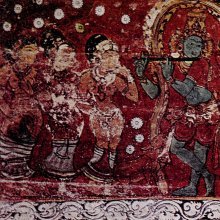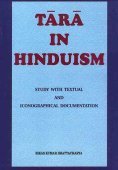Kalpavriksha, Kalpavṛkṣa, Kalpa-vriksha: 22 definitions
Introduction:
Kalpavriksha means something in Hinduism, Sanskrit, Jainism, Prakrit, Marathi, Hindi, biology. If you want to know the exact meaning, history, etymology or English translation of this term then check out the descriptions on this page. Add your comment or reference to a book if you want to contribute to this summary article.
The Sanskrit term Kalpavṛkṣa can be transliterated into English as Kalpavrksa or Kalpavriksha, using the IAST transliteration scheme (?).
Alternative spellings of this word include Kalpvraksh.
Images (photo gallery)
In Hinduism
Purana and Itihasa (epic history)
Source: archive.org: Puranic EncyclopediaKalpavṛkṣa (कल्पवृक्ष).—A tree in Devaloka. It has the power of giving any object that one wishes to get. There are five Kalpavṛkṣas in Devaloka. Their names are: Mandāra, Pārijāta, Santāna, Kalpavṛkṣa and Haricandana.
Agni Purāṇa, third Chapter mentions that among the wonderful things obtained by the churning of the ocean of milk, there was Kalpavṛkṣa also. So Kalpavṛkṣa was born from the ocean of milk.
Source: archive.org: Shiva Purana - English TranslationKalpavṛkṣa (कल्पवृक्ष) refers to the “wish-yielding kalpa tree” and is used to describe Śiva, according to the Śivapurāṇa 2.2.42.—Accordingly, as Dakṣa bowed and eulogised Śiva:—“[...] Today I have realised the truth. Thou art above all. Thou art served by Viṣṇu, Brahmā and others. Thou art the supreme Being known only through the Vedas. Thou art the wish-yielding Kalpa tree (i.e., kalpavṛkṣa) to the good. Thou punishest the wicked always. Thou art the independent great soul. Thou art the bestower of desired boons on the devotees. [...]”.
Source: Cologne Digital Sanskrit Dictionaries: The Purana IndexKalpavṛkṣa (कल्पवृक्ष).—A divine tree;1 gift of a golden tree, leads one to be born Rājarāja after a sojourn in viṣnuloka;2 gave clothes, jewels and honey in the kṛtayuga.3

The Purana (पुराण, purāṇas) refers to Sanskrit literature preserving ancient India’s vast cultural history, including historical legends, religious ceremonies, various arts and sciences. The eighteen mahapuranas total over 400,000 shlokas (metrical couplets) and date to at least several centuries BCE.
Kavya (poetry)
Source: academia.edu: Bhoja’s Mechanical GardenKalpavṛkṣa (कल्पवृक्ष) refers to “wishing trees”.—There is the history of gardens and garden technology in early medieval India. By the eleventh century, the garden had long been a site dense with meaning in South Asia. It brought together earlier traditions of fabulous jewel trees (ratnavṛkṣas), wishing trees (kalpavṛkṣas), and wishing creepers (kalpalatās) that had decorated the railings of Buddhist stūpas and populated Buddhist heavens, with a whole series of architectural and design technologies like bowers, fountains, tanks, and fountain houses that had also become standard appurtenances of royal pleasure gardens by the seventh century

Kavya (काव्य, kavya) refers to Sanskrit poetry, a popular ancient Indian tradition of literature. There have been many Sanskrit poets over the ages, hailing from ancient India and beyond. This topic includes mahakavya, or ‘epic poetry’ and natya, or ‘dramatic poetry’.
Vaishnavism (Vaishava dharma)
Source: Brill: Śaivism and the Tantric Traditions (vaishnavism)Kalpavṛkṣa (कल्पवृक्ष) refers to “wish-fulfilling trees”, according to the Vedānta Deśika’s Yatirājasaptati.—There are allusions to Rāmānuja’s “protection” of the Vedas, his defeat of those who hold other Vedāntic views as well as the significance of his establishment of the right interpretation of the Vedas in innumerable verses of the Yatirājasaptati. [...] Verse 31 captures in a lovely set of images the nature of Rāmānuja’s works.They are wish-fulfilling trees (kalpavṛkṣa) for the imagination of debaters, oozing with the nectar of Hari’s feet, possessing many branches so that they can remove suffering/heat, and subduing (with their perfume) the stench of sins.

Vaishnava (वैष्णव, vaiṣṇava) or vaishnavism (vaiṣṇavism) represents a tradition of Hinduism worshipping Vishnu as the supreme Lord. Similar to the Shaktism and Shaivism traditions, Vaishnavism also developed as an individual movement, famous for its exposition of the dashavatara (‘ten avatars of Vishnu’).
General definition (in Hinduism)
Source: Wisdom Library: HinduismKalpavṛkṣa (कल्पवृक्ष) is a Sanskrit word referring to “wish-fulfilling trees”.
In Jainism
General definition (in Jainism)
Source: Google Books: Faith & Philosophy of JainismKalpavṛkṣa (कल्पवृक्ष).-Jains believe that at the upswing of each time cycle, masses will lose religious faith again. All wishes will be granted by wish-granting trees (Kalpavrksa), and individuals will be born in set of twins (yugalika) with one boy and one gril who stay together all their lives: a symbol of an integrated human with male and female features balanced.
Source: Encyclopedia of Jainism: Tattvartha Sutra 3: The Lower and middle worldsKalpavṛkṣa (कल्पवृक्ष) refers to “wishing trees” used by the inhabitants of Bhogabhūmis (paradise) for obtaining their food, clothing, etc. The word Bhogabhūmi applies to various regions situated within Jambūdvīpa: the first continent of the Madhya-loka (middle-word), according to the 2nd-century Tattvārthasūtra 3.10. How many types of wish trees (kalpavṛkṣa) are there? They are of ten types, namely: Madhyāṅga, Vāditrāṅga, Bhūṣaṇāṅga, Mālyāṅga, Jyotirāṅga, Dipāṅga, Gṛhāṅga, Bhojāṅga, Bhājāṅga and Vastrāṅga.
Jambūdvīpa (where the Kalpavṛkṣa is used) is in the centre of all continents and oceans; all continents and oceans are concentric circles with Jambūdvīpa in the centre. Like the navel is in the centre of the body, Jambūdvīpa is in the centre of all continents and oceans. Sumeru Mount is in the centre of Jambūdvīpa. It is also called Mount Sudarśana.
Kalpavṛkṣa (कल्पवृक्ष) refers to “wishing trees”, according to the 11th century Jñānārṇava, a treatise on Jain Yoga in roughly 2200 Sanskrit verses composed by Śubhacandra.—Accordingly, “The wishing gem, divine treasure, cow of heaven, [and] wishing trees [com.—kalpavṛkṣa] along with Lakṣmī—I think these are servants existing from ancient times of the doctrine. The doctrine bestows upon embodied souls prosperity which is desired by Indra and the lords of men and snakes, and is to be revered in the three worlds”.
Synonyms: Kalpāṅghripa, Kalpapādapa.

Jainism is an Indian religion of Dharma whose doctrine revolves around harmlessness (ahimsa) towards every living being. The two major branches (Digambara and Svetambara) of Jainism stimulate self-control (or, shramana, ‘self-reliance’) and spiritual development through a path of peace for the soul to progess to the ultimate goal.
Biology (plants and animals)
Source: Google Books: CRC World Dictionary (Regional names)1) Kalpavriksha in India is the name of a plant defined with Bombax ceiba in various botanical sources. This page contains potential references in Ayurveda, modern medicine, and other folk traditions or local practices It has the synonym Salmalia malabarica (DC.) Schott & Endl. (among others).
2) Kalpavriksha is also identified with Terminalia bellirica It has the synonym Myrobalanus laurinoides (Teijsm. & Binn.) Kuntze (etc.).
Example references for further research on medicinal uses or toxicity (see latin names for full list):
· Plants of the Coast of Coromandel (1805)
· Taxon (1961)
· Species Plantarum (1753)
· Flora Indica, or ‘Descriptions of Indian Plants’ (1768)
· Hooker’s Journal of Botany Kew Gard. Misc. (1851)
· Meletemata Botanica (1832)
If you are looking for specific details regarding Kalpavriksha, for example side effects, pregnancy safety, extract dosage, diet and recipes, health benefits, chemical composition, have a look at these references.

This sections includes definitions from the five kingdoms of living things: Animals, Plants, Fungi, Protists and Monera. It will include both the official binomial nomenclature (scientific names usually in Latin) as well as regional spellings and variants.
Languages of India and abroad
Marathi-English dictionary
Source: DDSA: The Molesworth Marathi and English Dictionarykalpavṛkṣa (कल्पवृक्ष).—m (S) The wishing-tree of Indra's heaven. See kalpataru. This term is applied severally to five trees, pāribhadra or limba, mandāra, pārijātaka, santāna, harīcandana. Another enumeration excludes pāribhadra, and makes kalpavṛkṣa itself one of the five. kalpavṛkṣā- khālīṃ basūna jhōḷīlā gāṇṭhī kāṃ dyāvyā? Why, when sitting under the Wishing-tree, should we close and tie up our bag? Also ka0 āṅgaṇī dēkha || tō kā- sāyā māgēla bhīka?
Source: DDSA: The Aryabhusan school dictionary, Marathi-Englishkalpavṛkṣa (कल्पवृक्ष).—m The wishing-tree of Indra's heaven.
Marathi is an Indo-European language having over 70 million native speakers people in (predominantly) Maharashtra India. Marathi, like many other Indo-Aryan languages, evolved from early forms of Prakrit, which itself is a subset of Sanskrit, one of the most ancient languages of the world.
Sanskrit dictionary
Source: DDSA: The practical Sanskrit-English dictionaryKalpavṛkṣa (कल्पवृक्ष).—
1) one of the trees of heaven or Indra's praradise, fabled to fulfill all desires; आसीत्कल्पतरुच्छायामाश्रिता सुरभिः पथि (āsītkalpatarucchāyāmāśritā surabhiḥ pathi) R.1.75; 17.26; Kumārasambhava 2.39;6.41.
2) a tree supposed to grant all desires; 'wish-yielding tree'; नाबुद्ध कल्पद्रुमतां विहाय जातं तमात्मन्यसिपत्रवृक्षम् (nābuddha kalpadrumatāṃ vihāya jātaṃ tamātmanyasipatravṛkṣam) R.14.48; मृषा न चक्रेऽ- ल्पितकल्पपादपः (mṛṣā na cakre'- lpitakalpapādapaḥ) N.1.15.
3) any productive or bountiful source; निगमकल्पतरोर्गलितं फलम् (nigamakalpatarorgalitaṃ phalam) Bhāgavata 1.1.3.
4) (fig.) a very generous person; सकलार्थिसार्थकल्पद्रुमः (sakalārthisārthakalpadrumaḥ) Pañcatantra (Bombay) 1.
Derivable forms: kalpavṛkṣaḥ (कल्पवृक्षः).
Kalpavṛkṣa is a Sanskrit compound consisting of the terms kalpa and vṛkṣa (वृक्ष). See also (synonyms): kalpataru, kalpadruma, kalpapādapa.
Source: Cologne Digital Sanskrit Dictionaries: Shabda-Sagara Sanskrit-English DictionaryKalpavṛkṣa (कल्पवृक्ष).—m.
(-kṣaḥ) One of the fabulous trees of Indra'S heaven; a tree which yields whatever may be desired. E. kalpa purpose, and vṛkṣa a tree.
Source: Cologne Digital Sanskrit Dictionaries: Benfey Sanskrit-English DictionaryKalpavṛkṣa (कल्पवृक्ष).—m. a tree yielding all wishes (cf. kalpataru), [Meghadūta, (ed. Gildemeister.)] 63; [Vikramorvaśī, (ed. Bollensen.)] [distich] 157.
Kalpavṛkṣa is a Sanskrit compound consisting of the terms kalpa and vṛkṣa (वृक्ष).
Source: Cologne Digital Sanskrit Dictionaries: Cappeller Sanskrit-English DictionaryKalpavṛkṣa (कल्पवृक्ष).—[masculine] = kalpataru.
Source: Cologne Digital Sanskrit Dictionaries: Monier-Williams Sanskrit-English DictionaryKalpavṛkṣa (कल्पवृक्ष):—[=kalpa-vṛkṣa] [from kalpa] m. = -taru, [Mahābhārata; Śakuntalā; Kumāra-sambhava vi, 6; Meghadūta; Mṛcchakaṭikā]
Source: Cologne Digital Sanskrit Dictionaries: Yates Sanskrit-English DictionaryKalpavṛkṣa (कल्पवृक्ष):—[kalpa-vṛkṣa] (kṣaḥ) 1. m. One of the fabulous trees of Indra’s heaven.
[Sanskrit to German]
Sanskrit, also spelled संस्कृतम् (saṃskṛtam), is an ancient language of India commonly seen as the grandmother of the Indo-European language family (even English!). Closely allied with Prakrit and Pali, Sanskrit is more exhaustive in both grammar and terms and has the most extensive collection of literature in the world, greatly surpassing its sister-languages Greek and Latin.
Hindi dictionary
Source: DDSA: A practical Hindi-English dictionaryKalpavṛkṣa (कल्पवृक्ष) [Also spelled kalpvraksh]:—(nm) see [kalpa-taru].
...
Kannada-English dictionary
Source: Alar: Kannada-English corpusKalpavṛkṣa (ಕಲ್ಪವೃಕ್ಷ):—
1) [noun] = ಕಲ್ಪತರು - [kalpataru -] 1 & 2.
2) [noun] (Jain.) a kind of worship Jaina kings used to perform.
3) [noun] (vīr.) a particular sacred hymn.
--- OR ---
Kaḷpavṛkṣa (ಕಳ್ಪವೃಕ್ಷ):—
1) [noun] (myth.) a wish-yielding tree of the Heavens.
2) [noun] (fig.) a person who grants to another all that is wished for.
Kannada is a Dravidian language (as opposed to the Indo-European language family) mainly spoken in the southwestern region of India.
See also (Relevant definitions)
Partial matches: Vriksha, Kalpa.
Starts with: Kalpavrikshadana, Kalpavrikshalata, Kalpavrikshasvarupa.
Ends with: Gaurangastavakalpavriksha, Jyotishkalpavriksha, Satkalpavriksha.
Full-text (+78): Devataru, Manorathadayaka, Kalpapadapa, Kalpadushya, Suradruma, Kalpavrikshalata, Kalpabriksha, Kalpapushpa, Kalpamahiruh, Kalpakuja, Kalpataru, Kalpadruma, Pancavriksha, Kalpashakhin, Kalpavitapin, Animesha-anokaha, Kalpalata, Satkalpavriksha, Kalpvraksh, Surashakhin.
Relevant text
Search found 40 books and stories containing Kalpavriksha, Kalpa-vriksha, Kalpa-vrksa, Kalpa-vṛkṣa, Kalpavṛkṣa, Kalpavrksa, Kaḷpavṛkṣa; (plurals include: Kalpavrikshas, vrikshas, vrksas, vṛkṣas, Kalpavṛkṣas, Kalpavrksas, Kaḷpavṛkṣas). You can also click to the full overview containing English textual excerpts. Below are direct links for the most relevant articles:
Garga Samhita (English) (by Danavir Goswami)
Verse 2.17.14 < [Chapter 17 - The Meeting of Śrī Rādhā-Kṛṣṇa]
Verse 4.19.69 < [Chapter 19 - A Thousand Names of Srī Yamunā]
Verse 8.13.48 < [Chapter 13 - A Thousand Names of Lord Balarāma]
Puranic encyclopaedia (by Vettam Mani)
Chaitanya Bhagavata (by Bhumipati Dāsa)
Verse 2.1.53 < [Chapter 1 - The Beginning of the Lord’s Manifestation and His Instructions on Kṛṣṇa-saṅkīrtana]
Verse 3.2.401 < [Chapter 2 - Description of the Lord’s Travel Through Bhuvaneśvara and Other Placesto Jagannātha Purī]
Song 6 < [Grantharambha (the book begins)]
Song 28 < [Śacī-mātār Śoka (Mother Śacī’s Grief)]
Song 11 < [Grantharambha (the book begins)]
Jainism in Odisha (Orissa) (by Ashis Ranjan Sahoo)
Related products




